Ignition Overview
The ignition system is a very critical, and commonly
overlooked, link in obtaining maximum power, drivability,
and reliability from your car. The major components in
the ignition system are the spark plugs, spark plug wires,
and coils. As you increase the performance of the car,
you will place a larger demand on these components than
what they were designed for. We’ve seen significant
increases in how well the car performs by simply addressing
the car's ignition requirements.
Spark Plugs
On a rotary engined car the spark plug life is very hard
and short lived. Typical spark plug life is around 15,000
miles on a stock car and less as they are modified. In
order to keep the car running up to optimal performance
and lessen the chance of damage to the motor, we highly
recommend you check your plugs at regular intervals and
replace them as needed.
Spark Plug Wires
For maximum spark, you want as much energy getting to
the plug from the coils. The object is to keep the resistance
to a minimum without creating any ‘noise’ which
can interfere with some of the computers built into the
car. The stock wires don't offer much in the name of
performance and will increase in resistance with age.
For upgrades, we offer two types of plugs wires; a high
performance set suited well for both street and race
cars and a standard, original equipment style set by
NGK.
Ignition Computers and Coils
Once you’ve upgraded the car exhaust and intake,
we highly recommending installing an upgraded ignition
computer and coils to ensure complete combustion. As
power levels and air flow increase, the stock coils will
have problems producing enough energy to completely burn
the air/fuel charge and power is lost. We only use special
ignition computers that were designed for use on a rotary
engine to help the engine produce higher and smoother
power.
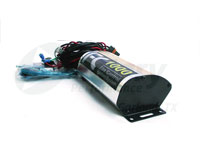
 Need
ignition? Jacob’s rotary FC1000 is the one
to have. We’ve installed this system on countless
RX-7s and have been nothing but pleased with the
results. Cleaner plugs and no misfires. This is a
true capacitive discharge system, not just a simple
restrike system like the HKS Twin-Power. This system
actually amplifies the spark with up to three times
the spark intensity. The FC1000 can be used with
the factory ignition coil, but many often maximize
the system with the addition of a performance coil.
An additional feature is a dedicated tachometer output.
This lead can be used for a shift light input, rpm
activated switch, additional injector controller
input, etc. Priced reasonably, this system installs
easily with standard MSD connections. Install one
today.
Need
ignition? Jacob’s rotary FC1000 is the one
to have. We’ve installed this system on countless
RX-7s and have been nothing but pleased with the
results. Cleaner plugs and no misfires. This is a
true capacitive discharge system, not just a simple
restrike system like the HKS Twin-Power. This system
actually amplifies the spark with up to three times
the spark intensity. The FC1000 can be used with
the factory ignition coil, but many often maximize
the system with the addition of a performance coil.
An additional feature is a dedicated tachometer output.
This lead can be used for a shift light input, rpm
activated switch, additional injector controller
input, etc. Priced reasonably, this system installs
easily with standard MSD connections. Install one
today.
FC1000
by Jacobs Electronics
Price: $179.00




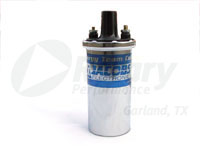

When upgrading your
stock ignition system, don’t
overlook the aging factory coils. The coils are what supply
the high voltage to the spark plugs so if these are not
up to the task of supplying enough “fire”,
performance will definitely suffer. Also note that if
you’re installing a Jacobs Rotary Pak ignition
computer, it is HIGHLY advised that you upgrade your
coils as well.
The Jacobs Energy Coil is meant to exactly replace the
stock coils and incorporates the same cylinder shape for
a perfect fit.
Jacobs
Energy Coil 79-85
Price: $49.95




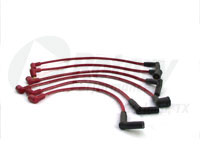
 Magnecor’s
R-100 Racing (10mm) Ignition Cables feature Magnecor’s
exclusive 2.5mm high capacity Metallic Inductance EMI
Suppressed conductor consisting of stainless steel wire
precisely wound at 200 turns per inch over a ferrimagnetic
core. The insulating jacket is made entirely of Magnecor’s
exclusive TC-1500-HS high strength aerospace grade silicone
rubber, and its single layer construction will prolong
the jacket’s insulating ability by conducting extreme
heat away from hot-spots that occur near over-the-limit
heat sources.
Magnecor’s
R-100 Racing (10mm) Ignition Cables feature Magnecor’s
exclusive 2.5mm high capacity Metallic Inductance EMI
Suppressed conductor consisting of stainless steel wire
precisely wound at 200 turns per inch over a ferrimagnetic
core. The insulating jacket is made entirely of Magnecor’s
exclusive TC-1500-HS high strength aerospace grade silicone
rubber, and its single layer construction will prolong
the jacket’s insulating ability by conducting extreme
heat away from hot-spots that occur near over-the-limit
heat sources.

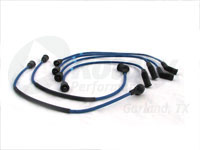
 Our
favorite wires made by Japan’s leading supplier
to the electronics industry, NGK wires have a unique
internal spiral wound core to reduce resistance and
are housed in a teflon coated blue housing to minimize
electromagnetic interference.
Our
favorite wires made by Japan’s leading supplier
to the electronics industry, NGK wires have a unique
internal spiral wound core to reduce resistance and
are housed in a teflon coated blue housing to minimize
electromagnetic interference.
NGK
Plug Wire Set 79-85
Price: $24.95




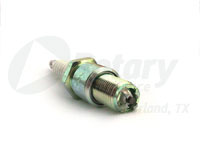
 Keep
your ride running at its best. Spark plugs should
be changed once a year or every 12~15,000 miles.
Bad plugs are the #1 cause of hard starts, engine missing, poor
emissions, etc. 1979-80 models need the BR7ET's and 1981-85 use
the BR8EQ14's. Heavier modified cars should consider using four
#7 or
#9 1986-91 model spark plugs, for increased plug durability.
Keep
your ride running at its best. Spark plugs should
be changed once a year or every 12~15,000 miles.
Bad plugs are the #1 cause of hard starts, engine missing, poor
emissions, etc. 1979-80 models need the BR7ET's and 1981-85 use
the BR8EQ14's. Heavier modified cars should consider using four
#7 or
#9 1986-91 model spark plugs, for increased plug durability.

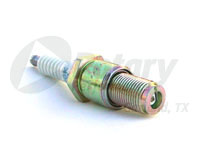
 For
cars that spend time of the track and/or are highly modified,
the NGK Racing plugs are highly recommended.
For
cars that spend time of the track and/or are highly modified,
the NGK Racing plugs are highly recommended.
